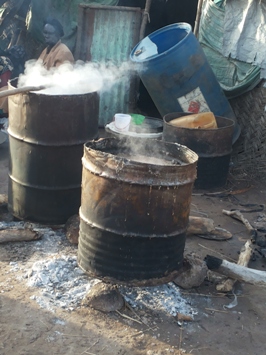Alcohol sales resumes in Wulu as high prices hit Rumbek Central
August 12, 2014 (RUMBEK) – The manufacture of alcohol as resumed in Lakes state’s Wulu county despite a state-wide ban.

Military caretaker governor Maj-Gen Matur Chut Dhuol imposed a ban on the sale of alcohol across Lakes state’s eight counties in January 2013
Wulu commissioner Benjamin Akol Muorwel has reportedly opened a shop where he sells beer purchased in Western Equatoria’s Mvolo county.
It has been alleged that Muorwel bought his brother, Aboki Jor, a new motorcycle for the purposes of transporting beer from Mvolo to Wulu and has threatened local youth over social media posts related to the sale of alcohol.
Market prices have continued to increase in Rumbek Central county, with traders complaining of high taxes and poor road connections between the capital, Juba, and Rumbek.
Trader Moses Amule said the compulsory 10% tax and poor road conditions meant it often took a month for lorries to reach Rumbek.
He said roads between Yirol and Rumbek town are particularly dangerous for businessmen due to the deep potholes and swampy water that covers the main road.
Local consumers have complained of high price hikes for basic goods, with a small sack of maize now selling for 100 South Sudanese pounds (SSP), up from 60 SSP, while 50kg of maize has increased from 150 to 200 SSP.
Residents also say that Dhuol’s ban on alcohol last year has left many war widows without a livelihood.
Thousands of people from remote villages around Rumbek East, Rumbek North, Cueibet counties are now seeking refuge with relatives in Rumbek Central county.
Following Dhuol’s announcement that alcohol sales would be banned, several women’s groups, mainly comprising those who lost their husbands during the long civil war with Sudan, protested the decision, saying the ban would leave them without a viable income alternative.
A local alcoholic consumer spoke to Media clarify how his consume the alcohol although being officially banned.
However, local resident Emmanuel Kenyi said that the ban had caused significant stress for war widows, many of whom have been forced to withdraw their children from school as they were no longer able to afford the cost of education.
Kenyi also maintains that the ban has done little to halt alcohol consumption, instead driving the industry underground.
“I drink in [a] special manner. I buy it from [a] dark room from women who [are] prepared to face [the] risk,” he said, adding that one bottle of beer costs 10 SSP.
Authorities in Lakes state banned the drinking of alcohol in social gatherings and ceremonies to curb the rising levels of insecurity in the area.
However, activists have publicly disputed the motivation for the ban on alcohol, saying the government should instead focus on reforms to the justice sector, improving access to education and reducing bride dowry prices.
Local police say state authorities have become increasingly isolated, with the public refusing to share information with law enforcement officers, making it increasingly difficult to investigate killings and maintain law and order in the region.
There are growing calls for South Sudan’s president Salva Kiir Mayardit to relieve the caretaker governor, however, those calls have so far been overlooked.
(ST)
